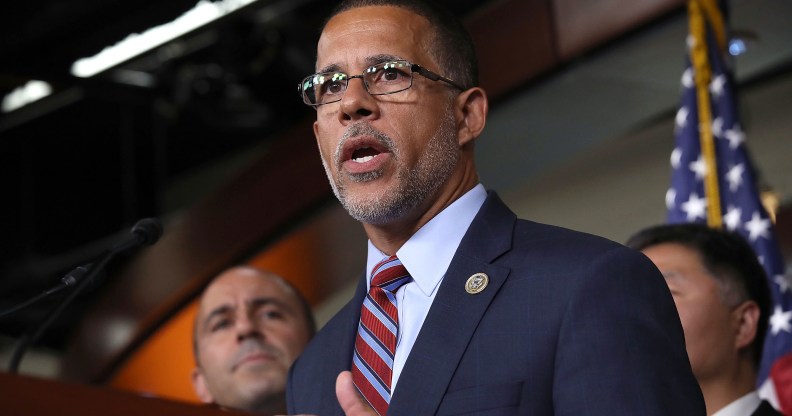Trump’s ban on transgender troops blocked by Democrats

WASHINGTON, DC – JULY 18: Rep. Anthony Brown (D-MD) speaks during a press conference at the U.S. Capitol July 18, 2018 in Washington, DC. Brown and other members of the House Democratic caucus who are military veterans spoke out “against the president’s summit with Putin where he denounced the intelligence community and suggested Russia did not interfere in the 2016 presidential election.” (Photo by Win McNamee/Getty Images)
US President Donald Trump’s policy banning openly transgender troops from serving in the military hit a stumbling block on Tuesday (June 18), when a majority of lawmakers voted against it.
Members of the House of Representatives voted 243-183 to adopt an amendment that will block funding for Trump’s trans troop ban.
The vote came during a debate on a $1 trillion spending package that includes the military spending bill.
Republicans argued that allowing trans people to serve openly in the military would undermine the “military readiness” and “unit cohesion” of troops.
But Anthony Brown, the Democrat for Maryland, said that this argument had historically been used to justify racially segregating the military.
“My service in an integrated armed forces did not harm readiness,” said Brown, who is African American.
“Every service chief testified that transgender service would not disrupt unit cohesion or readiness,” he said.
The amendment was proposed by Jackie Speier, the Democrat for California, and will block military funding from being used to implement the new policy, which has been in effect since April 12.
Trump’s policy – first announced in a series of tweets on July 26 2017 – requires trans people with a diagnosis of gender dysphoria to serve in the military as the gender they were assigned at birth.
It also means that people with a trans history are barred from serving in the military unless they have lived as the gender they were assigned at birth for three years and have not socially or medically transitioned.
An estimated 14,700 members of the US military are trans. Barack Under Obama’s presidency, trans people already serving in the military were allowed to be open about their trans status.
Trump’s policy is also being challenged in court.
“With so much anger and so much hate in the world today, it is time to be kind to people,” said Peter Visclosky, the Democrat representative for Indiana.

